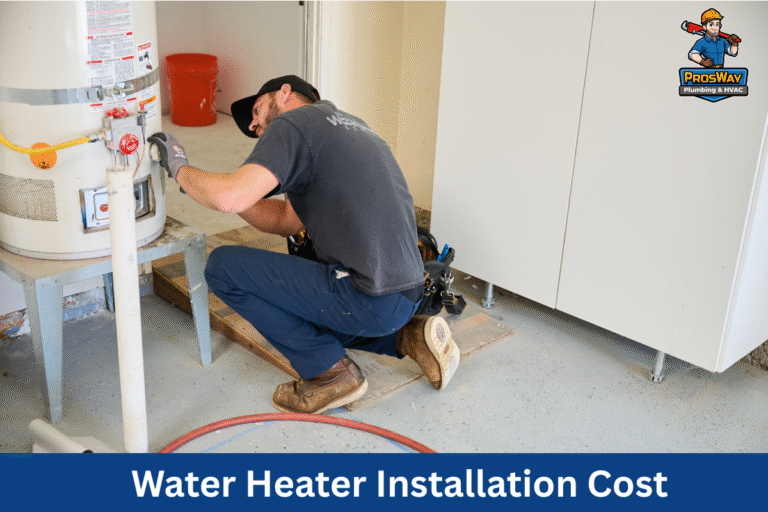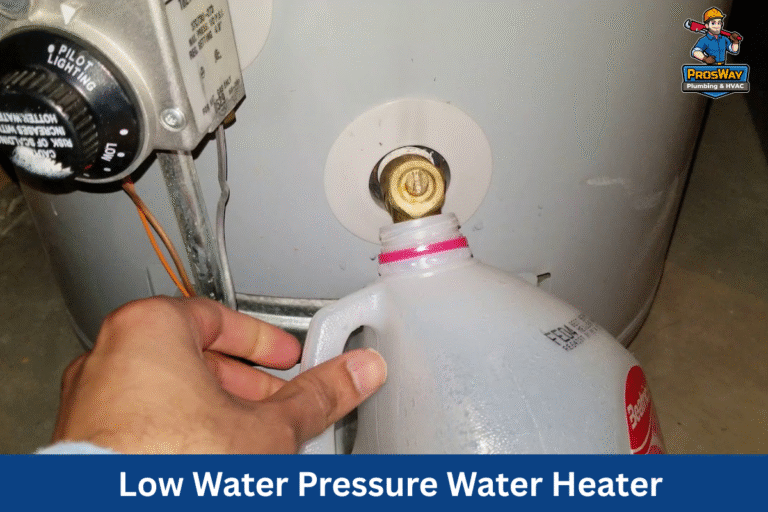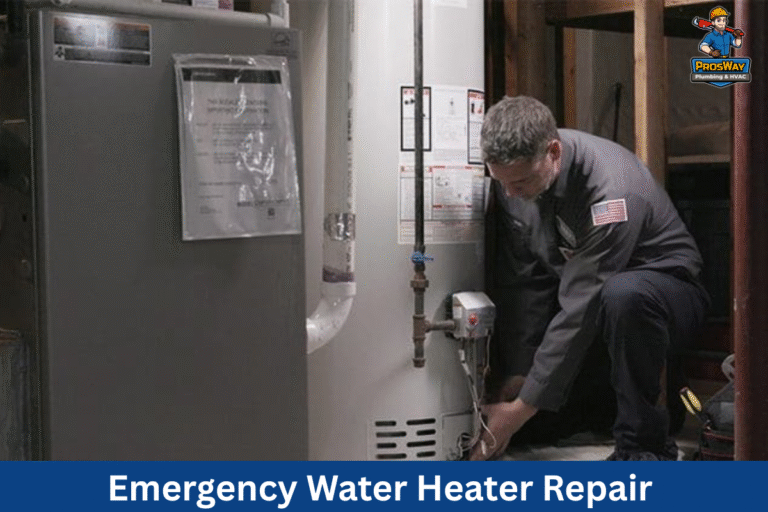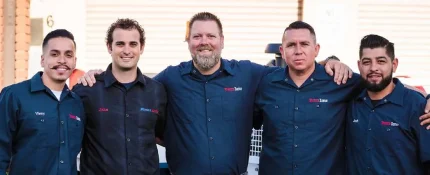At ProsWay Plumbing & HVAC, we help Northern New Jersey homeowners decide whether sewer line repair or replacement makes more sense. Factors like damage severity, property value, and plumbing age all play a role.
This guide breaks down costs, signs of serious issues, and modern options like trenchless repairs, so you can make a smart, lasting decision for your home.
Key Takeaways
- Repairing or replacing a sewer line involves balancing initial costs with long-term benefits.
- Evaluating the condition of your sewer system is crucial to determine the right approach.
- Full replacement often provides lasting durability, compliance with modern codes, and improved wastewater flow.
- Modern trenchless and camera inspection technologies can reduce both disruption and costs.
- Making an informed choice can protect your property value and reduce environmental risks.
What Are the Long-Term Costs of Sewer Repair vs. Replacement?
When we started comparing the costs of repairing versus completely replacing a sewer line, we realized the true expenses extend far beyond a one-time service fee.
The upfront investment for sewer repair is usually lower than that for a full replacement, but recurrent maintenance costs can add up over time.
What’s the Upfront Cost Difference?
The initial costs of repair work typically include labor, materials, and sometimes minor restoration work. In contrast, a full sewer line replacement requires a larger investment, often involving specialized equipment and significant labor hours.
We have observed cases where homeowners who opted for continual repairs spent over a decade more than those who went with a one-time full replacement.
Calculating Recurrent Repair Expenses Against a One-Time Replacement Cost
When evaluating your options, consider recurring repair expenses as hidden costs that accumulate over time. A series of repairs over 10 to 20 years can quickly add up, especially if your sewer line is constantly in need of patching.
Replacement, though a major investment at the outset, provides a level of durability that minimizes future outlays. We have seen several residences where a complete sewer line overhaul improved comparison on the long-term maintenance bills.
How Sewer Line Choices Affect Property Resale Value?
A well-maintained sewer system is essential for preserving your property’s value. Prospective buyers are likely to factor in the condition of major systems.
We have encountered buyers who were deterred by a history of frequent sewer repairs due to concerns about underlying unresolved issues. Conversely, a new, fully replaced sewer line can give sellers confidence, often increasing the property’s market appeal.
What Conditions Determine Sewer Line Repair or Replacement?

Not every sewer line problem requires a complete replacement. As a homeowner, you must accurately assess the condition of your sewer line to make the best repair decision.
Several factors come into play, including visible cracks, leaks, and the history of the system’s performance. It’s essential to differentiate between isolated issues that can be remedied with targeted repairs.
What Issues Can Be Fixed Without Full Replacement?
Minor issues can often be effectively managed with spot repairs or pipe lining. In our experience, if damage is localized to a particular section of the pipe, a focused repair may restore normal function without incurring the larger expense of full replacement.
These repairs typically involve epoxy coatings or resin lining techniques that seal cracks and prevent further water leakage. Addressing these minor problems quickly can prevent them from evolving into more significant issues.
When Is Full Sewer Line Replacement Necessary?
On the other hand, extensive pipe corrosion, multiple cracks, or structural deformations usually indicate a comprehensive failure. In cases where repairs have repeatedly failed to address persistent issues.
Like backflow or slow drainage, the evidence suggests that the aging pipe system has reached a critical point. We have seen properties where recurring failures were a prelude to a complete collapse of the sewer system.
The Role of Age and Material in Your Sewer Line Decision
Older sewer lines, especially those made of outdated materials such as cast iron or clay, are more prone to deterioration. The age of the system is a significant factor; pipes that have served for decades are likely to experience progressive wear and tear.
We always advise homeowners to consider the material composition when evaluating repair options. Modern materials like PVC or high-density polyethylene (HDPE) offer superior longevity and resistance to environmental factors.
What Are the Benefits of Sewer Line Replacement Over Repair?
From my perspective, opting for a complete sewer line replacement can offer substantial long-term benefits compared to repeated repairs.
Although the initial cost is higher, the durable nature of modern materials and the elimination of frequent interruptions are major reasons to consider replacement.
The improved system efficiency and enhanced structural integrity alone can translate into significant financial savings over time.
How Do Modern Materials Improve Durability?
New sewer line installations commonly use materials like PVC, HDPE, or trenchless pipe lining solutions that are designed for longevity.
These materials are engineered to resist corrosion, chemical damage, and environmental stresses much more effectively than traditional cast iron or clay pipes.
In our consultations, I have seen that upgraded systems rarely require further interventions within their designed lifespan, making them a wise financial decision.
Improving Wastewater Flow and Reducing Future Blockages
The efficiency of wastewater flow is directly related to the integrity of the sewer line’s interior. Full replacement often improves pipe diameter consistency and reduces obstructions that can lead to clogs.
Upgraded systems provide smoother waste transport, minimizing the risk of backups that could damage property. Effective wastewater flow is critical in maintaining overall home comfort.
The Structural Advantages of a New Sewer Line for Your Property
A new sewer line installation contributes to the overall structural integrity of your property. Modern replacement techniques ensure proper alignment and secure burial of the pipes.
This can prevent future soil settling or shifts that might compromise adjacent foundations. In our professional experience, a new sewer line often becomes a silent guardian, maintaining the stability of the entire property base.
When Targeted Sewer Line Repairs Offer Practical Solutions?

While full replacement is sometimes necessary, there are situations where targeted repairs provide practical and cost-effective solutions.
In many cases, a localized problem may not merit the extensive work or expense of replacing an entire sewer line. Instead, addressing isolated issues with modern repair techniques can restore functionality.
Addressing Isolated Cracks or Leaks With Spot Repairs
If your sewer line shows only isolated cracks or small leaks, a spot repair strategy can be very effective. We have encountered several cases where a minor leak was promptly fixed using epoxy or resin-based solutions.
These focused repairs restore the integrity of the pipe without the extensive excavation required for full replacement. The repair process typically allows homeowners to resume normal activities sooner.
The Viability of Pipe Lining for Certain Types of Sewer Damage
Pipe lining is an excellent method for addressing certain types of sewer damage. This technique involves inserting a flexible liner coated with epoxy into the existing pipe.
The liner cures in place and creates a new, durable interior surface that seals cracks and prevents further leakage.
In many installations around our area, pipe lining has proven to be an efficient and cost-effective option that extends the life of the existing system without the need for full excavation.
Cost Effectiveness of Repairs for Newer Sewer Systems
For properties with relatively new sewer lines, regular maintenance and minor repairs can be a more cost-effective option. If the pipe is only a few years old, a repair might be all that is needed to maintain its functionality.
In such cases, spending on repairs allows the homeowner to defer a large capital expense and keep costs lower until the line reaches a natural end of life.
What Factors Make Full Sewer Line Replacement Necessary?
There are specific situations where the evidence clearly points toward the need for a full sewer line replacement. As a plumbing expert, we have advised many homeowners that outdated infrastructure leaves replacement as the only viable long-term solution.
The benefits gained from a complete replacement are not only functional but also contribute significantly to your property’s value and safety.
Dealing With Extensive Pipe Corrosion or Collapse
When a sewer line shows signs of widespread corrosion or parts of the pipe are collapsing, targeted repairs will not solve the underlying problems.
Extensive damage reduces the structural integrity of the system. We have encountered cases where extensive corrosion led to repeated repair attempts before the decision was made to replace the entire line.
Why Do Persistent Backups Signal the Need for Replacement?
Persistent backups and consistently slow drain times are strong indicators that your existing system is no longer functioning as it should. These symptoms usually stem from internal pipe damage or severe blockage issues.
In our experience, replacing the entire sewer line often resolves long-standing drainage problems and helps prevent future occurrences.
You can check out this video: When Should Sewer Lines Be Replaced?
Upgrading Undersized or Outdated Sewer Systems
Many older homes suffer from sewer systems that were built for lower flow capacities or using materials that are no longer considered adequate.
If your system is undersized or outdated, replacement allows you to upgrade to a system that can handle modern usage demands.
A fully replaced system that meets current building codes not only benefits daily operation but can also improve overall property efficiency.
How Do Modern Sewer Technologies Affect Repair or Replacement?
Advancements in technology have significantly influenced the methods available for both repairing and replacing sewer lines. As a professional involved in plumbing services across Parsippany, we have witnessed how modern tools can transform the decision-making process.
Like trenchless repair technology, video camera inspection systems, and advanced pipe materials. These innovations reduce disruption, lower costs, and improve overall outcomes.
Trenchless Repair Methods as an Alternative to Digging
Trenchless repair methods have revolutionized the way we handle sewer line issues. Instead of extensive digging, trenchless technology enables repairs through small access points.
They are especially appealing to homeowners who want to avoid the hassle and mess of large excavations while still receiving a reliable repair.
Trenchless Replacement Techniques for Minimal Disruption
In addition to repair, trenchless replacement techniques have become an industry standard for minimizing disruption during a full sewer line overhaul. Techniques such as pipe bursting and relining allow us to replace the damaged section.
These methods speed up the replacement process. Homeowners in Northern New Jersey appreciate the reduced downtime and less invasive work, ensuring that their daily routines are affected as little as possible.
Video Camera Inspections for Accurate Problem Diagnosis
Before proceeding with any repair or replacement, an accurate diagnosis is essential. Modern video camera inspection technology provides a clear view of the sewer line’s condition, revealing issues such as cracks, blockages, and intrusions by tree roots.
We rely on these inspections to provide detailed reports and guide the selection of the appropriate remedy. The transparency these cameras offer helps homeowners understand the extent of damage and build trust in the recommended solution.
Frequently Asked Questions
How do I know if my sewer line needs a full replacement or just a repair?
Look for persistent issues like recurrent backups, slow drains, or widespread cracks. If repairs have repeatedly failed, it likely indicates that a full replacement is necessary to ensure long-term reliability.
How do trenchless repair methods benefit my sewer line project?
Trenchless methods limit disruption by reducing excavation requirements, preserving your landscape, and speeding up the repair or replacement process, which is especially beneficial for busy homeowners.
Can modern sewer technologies really improve my system’s longevity?
Yes, using advanced pipe materials like high-density polyethylene and modern diagnostic tools ensures a more durable, efficient system with fewer future repair needs and better compliance with current codes.
Do environmental factors affect whether I should repair or replace my sewer line?
Absolutely. Soil conditions, tree root intrusion, and local moisture levels play a significant role. In harsh environments, full replacement with modern materials often provides increased durability and environmental safety.
Final Thoughts
Deciding between repairing and replacing your sewer line requires careful evaluation of both cost and long-term benefits. We have learned that while repairs might be cheaper initially, full replacement offers improved durability and increased property value. Modern technologies, including trenchless repair and advanced pipe materials, further enhance the benefits of replacement. For homeowners in Northern New Jersey, having a reliable sewer system is essential to maintaining a healthy and sustainable home environment.
Need Help Deciding on Repair or Replacement? Contact ProsWay
Get expert advice and honest answers from the trusted team at ProsWay Plumbing & HVAC. Whether it’s a quick repair or a full sewer line replacement, we’ll help you make the right call for your home and budget. Call us now at (862) 260-5870 or Book Online to schedule an inspection!








